|
Photo by Debra Lopez
|
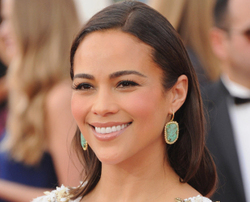 Some of it has been organic. Last year, the leads in Extant and How To Get Away With Murder, originally not written as black, became ethnic once stars of the caliber of Halle Berry and Viola Davis became interested. Such was the case with Jennifer Lopez and Eva Longoria, who both commanded on-air episodic orders from NBC when they committed to star in dramaShades Of Blue and comedyTelenovela, respectively, as well as Paula Patton, who lifted the cast-contingency off the ABC drama pilot Runner. (ABC and 20th TV cast Patten, who is black, knowing already that the male lead had been conceived as Hispanic. The role went to Adam Rodriguez.) That also was the case with meaty supporting roles on Fox’s Gotham last year, which went for Jada Pinkett Smith, and NBC drama pilot Endgame this time, landing Wesley Snipes. by Nellie Andreeva There was a noticeable shift toward minority castings last season, with more parts opening up to ethnic actors, a casting term used for non-Caucasian thesps. It was a concerted effort, with more than one instance where a family member role was rewritten as adopted to make them ethnic. Then, following the success of freshman series How To Get Away With Murder, Black-ish, Fresh Off The Boat, Jane the Virgin and especially Empire, which launched to huge ratings at the kickoff of pilot casting season, ethnic castings exploded this season. The change is welcomed by talent agents who no longer have to call casting directors and ask them if they would possibly consider an ethnic actor for a part, knowing they would most likely be rejected. “I feel that the tide has turned,” one agent said. “I can pitch any actor for any role, and I think that’s good.” Because of the sudden flood of roles for ethnic actors after years of suppressed opportunities for them, the talent pool of experienced minority performers — especially in the younger range — is pretty limited. That has led to a feeding frenzy, with a number of straight offers locking in ethnic talent before they could be snatched by another pilot. This is not to say that there weren’t other hot commodities this pilot season; star names were in demand as usual, as were hot young guys and girls and occasional foreigners with that “sparkle.” But the big trend this pilot casting season was the huge spike in the number and prominence of roles that went to minority actors. Also not earmarked as ethnic was the lead in NBC pilot Strange Call, a remake of an Australian series, which went to Community‘s Danny Pudi. CBS tried for a year to cast its comedy pilot Taxi-22, a remake of a French-Canadian series, until John Leguizamo signed on. And testing alongside actresses of different ethnicities, Natalie Martinez landed the lead in the NBC martial arts drama pilot Warrior. 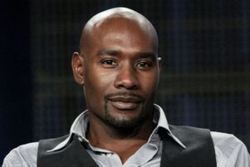 But there were more broadcast drama pilots than ever whose leads had been designated as black this year. That includes Fox medical drama Rosewood,toplined by Morris Chestnut, and CBS civil rights crime drama For Justice,starring Anika Noni Rose. Uncle Buck was rebooted by ABC specifically as a black family sitcom, with Mike Epps in the title role originated by John Candy. NBC opted to make the lead couple in its drama about diverse couples Love Is A Four Letter Word black in picking up the pilot. (It had been originally conceived as Caucasian.) After a post-table read recasting of the female role, the two leads went to Cynthia McWilliams and Rockmond Dunbar. There also have been a number of drama co-leads on which the networks chose to go ethnic this year, including Supergirl’s male lead, cast with Mehcad Brooks; one of the four female leads in ABC drama Broad Squad (Rutina Wesley); and the female lead in Minority Report (Meagan Good). 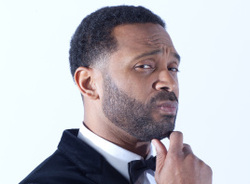 ABC, which has been in the forefront of the current wave of ethnic programming with freshmen How To Get Away With Murder, Black-ish, Cristela and Fresh Off The Boat, is leading the pack again with two black family comedies: Uncle Buck andDelores & Jermaine, starring comedian Jermaine Fowler and Whoopi Goldberg. The latter was based on the real-life experiences of comedian Fowler, as is ABC’s medical comedy Dr. Ken starring Ken Jeong. Additionally, NBC has Latino family magical drama The Curse Of The Fuentes Women with Hispanic lead cast, and CBS has the Rush Hour remake with black (Justin Hires) and Asian (Jon Foo) leads. 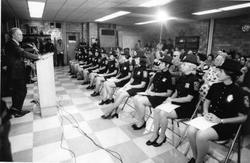 Uncle Buck and Love Is A Four Letter Word are among several projects where the original white protagonists have been changed to black this season. ABC’s medical drama pilot The Advocate was based on the story of former CAA agent Byrdie Lifson-Pompan and Dr. Valerie Ulene, who launched a healthcare consulting company. While the real-life inspiration for the two central character are both Caucasian, the show cast themwith one white actress, Kim Raver, and one black, Joy Bryant. As the photo of the 1972 graduation of the first 12-women class of the Boston Police Academy indicates, they appear to be all white, as were the members of the original Broad Squad, Rachel Keefe and Patricia Murphy, Boston’s first all-female patrol team. That is no surprise as non-Hispanic Whites constituted 80% of Boston’s population in 1970 versus 16% blacks. While set in the 1970s, ABC’s drama pilot Broad Squad, inspired by the real-life events, has a lead cast more consistent with Boston’s current racial makeup of 45% white non-Hispanic and 27% black as one of its four female leads was written and cast as African-American, Wesley. A lot of what is happening right now is long overdue. The TV and film superhero ranks have been overly white for too long, workplace shows should be diverse to reflect workplace in real America, and ethnic actors should get a chance to play more than the proverbial best friend or boss. But, as is the case with any sea change, some suggest that the pendulum might have swung a bit too far in the opposite direction. Instead of opening the field for actors of any race to compete for any role in a color-blind manner, there has been a significant number of parts designated as ethnic this year, making them off-limits for Caucasian actors, some agents signal. Many pilot characters this year were listed as open to all ethnicities, but when reps would call to inquire about an actor submission, they frequently have been told that only non-Caucasian actors would be considered. “Basically 50% of the roles in a pilot have to be ethnic, and the mandate goes all the way down to guest parts,” one talent representative said. In one instance, after a number of actors of different ethnicities tested for two roles in a pilot this year, two Caucasian actors ended up being the top choices for the two remaining regular parts. However, because of a mandate from the studio and network, one of the roles had to diverse, so the pilot could only cast one of the top choices and pass on the other to fulfill the ethnic quota. “They need to say the best man or woman wins,” one rep suggested. Replacing one set of rigid rules with another by imposing a quota of ethnic talent on each show might not be the answer, some industry insiders say. Empire, Black-ish, Jane the Virgin and Fresh Off The Boat have been breakouts because they represent worlds and points of view that were not on TV — a soapy hip-hop dynasty, an upper-class black family struggling with racial identity, a young Latina juggling her dreams and her heritage and an immigrant Asian family trying to fit in. 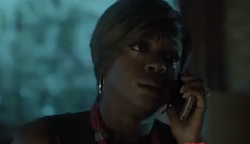 Television has been successful with shows that had both all-white (Friends, Seinfeld) and all-black (The Cosby Show) casts on the strength of their premise, execution and talent performances and chemistry. It is for the same reason that Scandal, HTGAWM and Empire have done so well with Kerry Washington, Davis and Taraji P. Henson as the respective leads. Trying to duplicate those series’ success by mirroring the ethnicity of their leads is a dubious proposition — if that was the key, 2010’s Undercovers, a slick drama with two appealing black leads, Boris Kodjoe and Gugu Mbatha-Raw, should’ve been a hit. While they are among the most voracious and loyal TV viewers, African-Americans still represent only 13% of the U.S. population. They were grossly underserved, but now, with shows as Empire, Black-ish, Scandal and HTGAWM on broadcast, Tyler Perry’s fare on OWN and Mara Brock Akil’s series on BET, they have scripted choices, so the growth in that fraction of the TV audience might have reached its peak. As the broadcast networks are looking to add a number of new series targeting black viewers in the fall, we will see if that viewership can further expand (Empire andBlack-ish have managed to successfully to co-exist in the same time slot this midseason). Since broadcast TV is a historically reactive business, that will determine whether the trend of ethnic casting will come back with a vengeance next season. Note: The original headline on the story has been changed as it did not correctly reflect the context of the article. Subscribe to Deadline Breaking News Alerts and keep your inbox happy
0 Comments
Your comment will be posted after it is approved.
Leave a Reply. |
Categories
All
|
 RSS Feed
RSS Feed